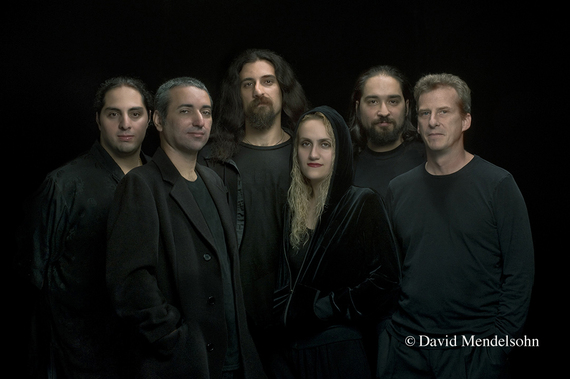Iranian Musician Anis Oveis Risks Everything for Music
Outside in the night air, a security guard keeps watch for authorities. Inside, a beautiful young woman fidgets with her scarf, making sure her hair is completely covered. The band Mavara, for which she plays keyboard, takes the stage, but at the first sign of trouble they are ready with a plan to shut everything down. They are nervous, not just because they are about to perform, but because they don't know what will happen to them if they are found out.
People begin to arrive. They are also a bit on edge, but motivated by the chance to gather with their underground community to indulge in the music they love, played by a beloved band. They have all heard about the concert through a complex, secret network of texts from unknown numbers and word of mouth. They found out the date and time a few days ago, but couldn't know the location until the last minute. They had to call another cell phone -- but never from their own personal cell phones -- to find out the address. Because they are in Iran, they could all be arrested and jailed; the band could have their equipment confiscated, get heavily fined, go to prison, maybe worse.
The progressive rock style of Mavara is unacceptable to the governing religious authorities. Iranian musicians can approach the Ministry of Islamic Guide and Culture to ask permission to play their music, but if it is not the classical, traditional Persian, or sanctioned versions of pop music (which often feature religious lyrics), their music might as well be illegal. The founder of Mavara applied but was denied because of their genre.
And if a musician is a woman, there exists a whole other level of offense, creating a higher level of intense fear. A woman who plays or sings music pre-approved by the Ministry can only perform in private to an audience of women only, with no cameras recording and no men on the staff or crew.
But on this night, as the crowd gathers in a private music school under the auspices of a class, the future is at stake. An unauthorized woman found playing restricted progressive rock music on stage in front of a mixed crowd could be imprisoned, tortured, or endure any combination and duration of unknown punishments; those who have been caught before don't speak out about what goes down. Anis Oveisi is the only woman in the Iranian progressive rock group Mavara.
Think about your greatest desire, your most cherished dream. Then ask yourself if you would actually put your life on the line to have it, to do what you dream about. Most Americans cannot fathom having to make such a choice. For Anis, making music has always been worth this risk. "I have such a strong desire to make people happy, to create a good time for them" through music, she says.
"I play music and music plays my life," is her mantra. A life without music would not be a life at all. And so she carefully tucks her hair under a hijab, just in case the authorities do raid their secret performance, since being uncovered on top of playing music illegally would make the punishment much more severe. Her keyboard is positioned to the back and side of the stage, for an easier escape. If they are caught, she is automatically the one in the most trouble.
Mavara was formed in 2001 by composer and keyboardist Farhood Ghadiri. Today, the band includes Ashkan Hamidi on vocals and guitar, Sina Khodaiefer on bass guitar, Jim Welch on drums, and Anis on the keyboard and synthesizer. Anis dreamed of playing piano as a child, and she played all her life. At 16, her father bought a really nice piano, encouraging her talent. At 18, she began studying composition at Tehran Conservatory.
There she met Ghadiri, who broke the ice by asking her questions about complicated rhythms. He asked her to play keyboard with them. It only took a few rehearsals for them to fall in love and decide to get married. She considers him her partner in crime.
Anis' Muslim family is supportive of her music, but knowing the risks a woman musician takes, they did try and influence her so that she would not get hurt. They urged her to work for the family business, a popular path for young women for basic reasons of protection and safety. Women do not often get safe opportunities to work outside the family, without running the risk of being sexually harassed, being taken advantage of, or even sometimes becoming a sex slave for their employer. Jobs for women are often menial with a very low salary, although in the capital city of Tehran, the prospects and conditions for professionally trained women have improved.
But Anis has never been interested in safety.
She and the band have been in the United States now for less than a year on a music work visa. It took almost two years and a very complicated process to make it happen, but Transit Music Group, the record label who found Mavara on Facebook, loved their sound and sensibility enough to help them come over. They are playing venues from Boston to North Carolina and beyond. They still have a tendency to set up in their "quick exit" formation, with Anis poised to the side. But she is emerging in many ways, wearing her hair however she wants, expressing herself in new ways, learning to interact with audiences, feeling out her freedoms.
The band has also gotten used to some less-than-warm welcomes in America. They've learned that Americans will peg them as crazy Iranians or Muslim fundamentalists. After the Boston Marathon bombing people called them terrorists. One article published online about Mavara garnered some nasty comments from readers using ridiculous stereotypes as weapons.
But Mavara's music is all about the opposite of that reaction: peace, compassion, and the beauty of universal similarities among human beings. The band is known for its deep, emotional lyrics developed by all of the members during their discussions about the great philosophies of the world. Their lyrics ruminate moodily on who God is, what it means to be human, and how to live whole in the universe. The song "Season of Salvation" haunts listeners with an almost religious tale of a time when Spring was the only season, alive and pure, before decisions humans made ruined it. But it bypasses all the damnation and picks up on the lessons we learn, the way human beings can look back on past history and create a better future. It is not an unpredictable, bipolar God who rescues condemned sinners in exasperation, but humans who learn from mistakes and push on with hope and cooperation toward salvation, with God's benevolent love as guide.
Mavara's own philosophy is that music is a story to expand people's minds, to make us think differently about how we live and what life is about. When I hear some of their songs, I know that we Americans could benefit from listening to these soulful Iranians. The sound and meaningful message is a far departure from what makes it big at our little "Party in the USA." Anis does not want their style of music to change because they are in the U.S.; they plan to hold on to their probing poetry and reflective style.
After hearing Anis' harrowing and triumphant stories of her journey from Iran to a new life, I can't help but wonder how she would advise her younger self. If she could say one thing to young Iranian girls, it would be "don't let go." If you find something you really love doing, she says, then go for it; no matter the risk, take advantage of every opportunity. When I ask what she might say to young American girls, she pauses for a moment.
"All that you may complain about -- school, clothes, friends -- you can still go wherever you want." In light of her own overwhelmingly difficult and often terrifying experiences -- taking the ultimate risk of leaving family, possessions and financial security behind to pursue her dream of making music -- she wishes for American girls a sense of gravity. "Don't waste your freedom," she says.
Anis is Iranian, but should also be an American progressive rock role model. She is living a life beyond her wildest dreams, because she believed in herself, believed in the love of a unifying God, and fearlessly followed her dream. It is fitting that the name Mavara translates, "beyond everything you think."
Find Mavara at mavaraband.com.



